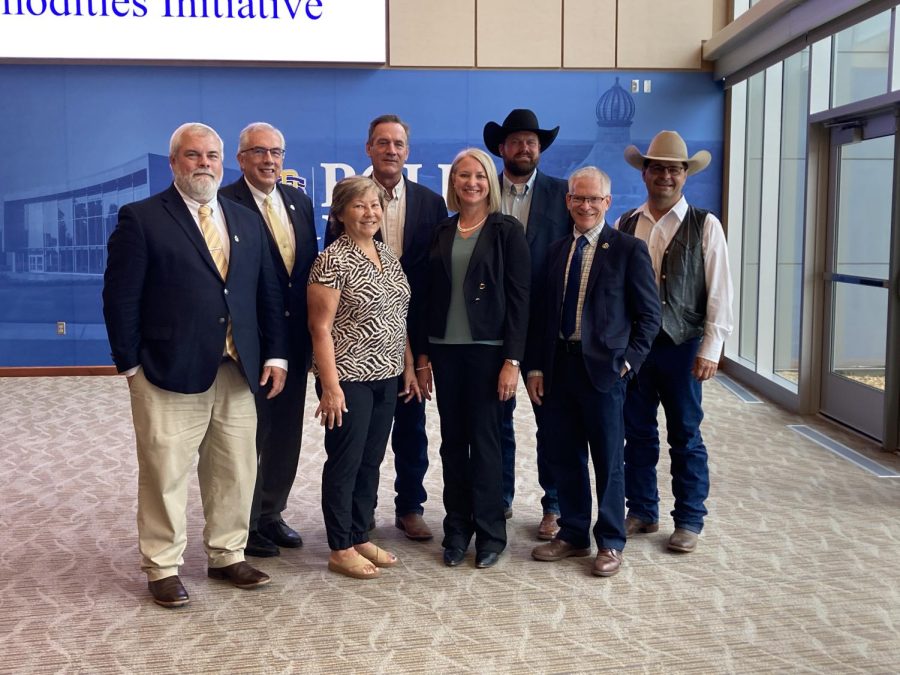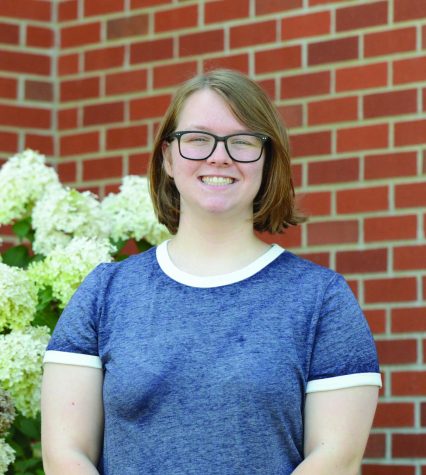$80 million grant sets SDSU record
USDA money will fund research for climate-conscious beef and bison production methods
University officials and other speakers attended the USDA grant announcement. From left: Dean Joseph Cassady, President Barry Dunn, USDA Risk Management Agency Administrator Marcia Bunger, Lt. Gov. Larry Rhoden, project lead Kristi Cammack, Jared Knock of Millborn Seeds, Vice President for Research and Economic Development Daniel Scholl and USDA Farm Service Agency Administrator Zach Ducheneaux.
September 20, 2022
South Dakota State University will get up to $80 million in grant money to help beef and bison producers who use climate-smart practices.
President Barry Dunn announced the United States Department of Agriculture grant last Friday during an event at the SDSU Foundation. USDA’s website lists the approximate funding ceiling for SDSU at $80 million, making it the largest grant ever received by the university, officials said.
Final funding levels will be determined in the coming months.
“This is a historic day for South Dakota State University and the state of South Dakota,” Daniel Scholl, vice president for research and economic development, said in a news release. “These types of investments in research are vital to helping solve the complex issues of today and answer questions that plague our society. The trust the USDA has in our project and our partners to invest at this level only shows the work that is being done at our university and the quality of our faculty and students to conduct this type of research.”
The five-year grant will be used to fund a new project under the USDA’s Partnerships for Climate-Smart Commodities Initiative. The project, titled “The Grass is Greener on the Other Side: Developing Climate-Smart Beef and Bison Commodities,” hopes to reward and inform producers on the most environmentally friendly way to improve their operations.
Officials said this project will bridge the gap between society and producers, debunk several myths about the agriculture world and let researchers and producers work together to create the most effective, climate-smart methods for producing bison and cattle.
“I believe there is a lot of misinformation in the popular press regarding common ag practices and their impact,” said Joe Cassady, dean of the College of Agriculture Food and Environmental Sciences. “This grant will help ensure that our livestock producers will continue to have the social license to operate.”
The project offers several incentives for producers to participate, officials said. Every operation that enrolls in the program will receive a premium for implementing environmentally positive practices, reducing implementation risk factor and rewarding those who wish to see it through.
According to officals, they will also have the potential to gain premiums for their livestock that are raised on operations that execute climate-smart practices. The result is to hopefully establish a market for producers that follow these practices and encourage others to do the same.
“One thing that’s important to us is making sure that this is workable for producers,” Amanda Blair, one of the project leaders and a meat science professor in the animal science department at SDSU, said. “Many of these practices are already utilized by beef and bison producers. We plan to quantify and measure the impact of these practices and to use that information to demonstrate and share how agriculture is a part of the climate solution, not the problem.”
Blair expanded on one reason behind SDSU’s success in applying for and receiving the grant.
“It feels like a family here at SDSU,” she said. “People might ask how did South Dakota pull this off? And it’s because we have a team of people that really care and truly want to help producers leave the land better than they found it.”
SDSU will collaborate with a team of partners to accomplish the project, officials said. That team includes Millborn Seeds, Buffalo Ridge Cattle Company, C-Lock, AgSpire, Texas A&M University, SDSU Center of Excellence for Bison Studies, Cold Creek Buffalo Company, Yard Stick, the National Bison Association, SmartScore.ai, Tanka Fund and SDSU Extension.
In addition to SDSU, only five other universities are listed as the lead on projects projected at $50 million in funding or higher—Virginia Polytechnic Institute and State University, Clemson University, Texas A&M Agrilife Research, Regents of the University of Idaho and Oregon State University.
Spanning up to five years, the 70 projects will:
Provide technical and financial assistance to producers to implement climate-smart production practices on a voluntary basis on working land;
Pilot innovative and cost-effective methods for quantification, monitoring, reporting and verification of greenhouse gas benefits; and
Develop markets and promote the resulting climate-smart commodities.
“As a researcher and administrator, this is a wonderful opportunity to be involved in a project that has such an impact on our state and the region,” Kristi Cammack, project lead and director of SDSU West River Research and Extension, said. “The livestock industry is a major driver of the overall economic health of South Dakota. The work we will be doing through the climate-smart commodities project will ensure the industry continues to grow and thrive for generations to come.”



















